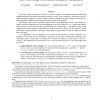Free Online Productivity Tools
i2Speak
i2Symbol
i2OCR
iTex2Img
iWeb2Print
iWeb2Shot
i2Type
iPdf2Split
iPdf2Merge
i2Bopomofo
i2Arabic
i2Style
i2Image
i2PDF
iLatex2Rtf
Sci2ools
100
click to vote
STOC
2007
ACM
2007
ACM
Zero-knowledge from secure multiparty computation
A zero-knowledge proof allows a prover to convince a verifier of an assertion without revealing any further information beyond the fact that the assertion is true. Secure multiparty computation allows n mutually suspicious players to jointly compute a function of their local inputs without revealing to any t corrupted players additional information beyond the output of the function. We present a new general connection between these two fundamental notions. Specifically, we present a general construction of a zero-knowledge proof for an NP relation R(x, w) which only makes a black-box use of any secure protocol for a related multi-party functionality f. The latter protocol is only required to be secure against a small number of "honest but curious" players. We also present a variant of the basic construction that can leverage security against a large number of malicious players to obtain better efficiency. As an application, one can translate previous results on the efficienc...
Algorithms | Communication Complexity | Secure Multiparty Computation | STOC 2007 | Zero-knowledge Proof |
Related Content
| Added | 03 Dec 2009 |
| Updated | 03 Dec 2009 |
| Type | Conference |
| Year | 2007 |
| Where | STOC |
| Authors | Yuval Ishai, Eyal Kushilevitz, Rafail Ostrovsky, Amit Sahai |
Comments (0)

